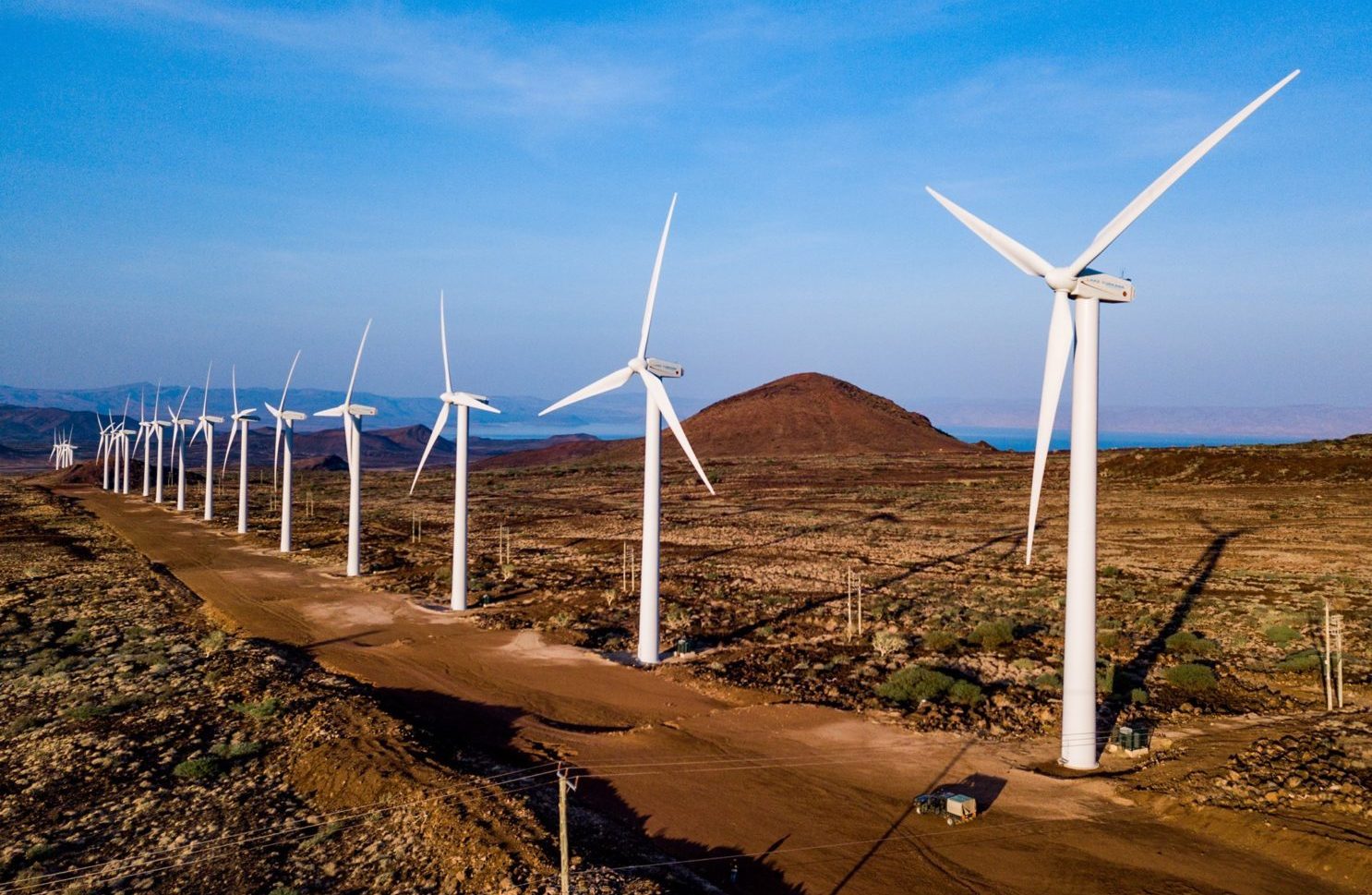Green Transition In Africa: Reshaping The Workforce In A Changing Climate

Table of Contents
The Growing Green Economy in Africa
The green transition in Africa is generating a wave of economic opportunities, fundamentally altering the job landscape. Two key sectors are experiencing explosive growth: renewable energy and sustainable agriculture.
Renewable Energy Sector Boom
Africa boasts abundant renewable energy resources, making it a prime location for green energy investments. Solar, wind, geothermal, and hydropower projects are proliferating across the continent, creating a surge in job demand. Countries like Morocco, Kenya, and South Africa are leading the charge, implementing ambitious renewable energy targets and attracting significant foreign investment.
- Increased demand for skilled technicians, engineers, and project managers: The rapid expansion requires a skilled workforce capable of designing, installing, maintaining, and operating renewable energy infrastructure.
- Opportunities in financing and investment: The green energy sector attracts considerable investment, creating jobs in financial analysis, project financing, and risk management.
- Growth of local businesses supporting the sector: From manufacturing solar panels to providing maintenance services, numerous local businesses are emerging to support the expanding renewable energy industry. This fosters local economic development and strengthens supply chains.
Sustainable Agriculture and Agri-tech
Climate change significantly impacts African agriculture, making sustainable practices crucial. Climate-smart agriculture, incorporating techniques like drought-resistant crops, efficient irrigation, and precision farming, is becoming increasingly important. Technology plays a vital role, offering solutions for improved yield, reduced water consumption, and minimized environmental impact.
- Demand for agricultural extension officers: Educating farmers on sustainable agricultural techniques and technologies is critical for successful implementation.
- Growth in data analytics and precision farming jobs: Using data-driven approaches to optimize farming practices creates opportunities for skilled data analysts and technicians.
- Opportunities in sustainable food production and distribution: Developing efficient and sustainable food supply chains, focusing on reducing food waste and promoting local markets, presents numerous employment opportunities.
Challenges of the Green Transition for the African Workforce
While the green transition offers immense potential, it also presents significant challenges for the African workforce. Addressing these head-on is essential for ensuring a just and equitable transition.
Skills Gap and Training Needs
A major obstacle is the lack of a skilled workforce proficient in green technologies. Bridging this skills gap requires substantial investment in education and training.
- Upskilling and reskilling programs for existing workers: Providing training opportunities for workers in traditional sectors to transition to green jobs is crucial to minimize job displacement.
- Investment in STEM education: Strengthening science, technology, engineering, and mathematics (STEM) education at all levels is essential to build a future workforce capable of driving innovation in the green economy.
- Partnerships with international organizations for knowledge transfer: Collaborations with international organizations can facilitate knowledge transfer, technology sharing, and capacity building.
Addressing Unemployment and Inequality
The green transition must be inclusive to avoid exacerbating existing inequalities. Job displacement in traditional sectors needs careful management to ensure a smooth transition for affected workers.
- Job creation programs targeting vulnerable populations: Prioritizing job creation for marginalized communities is vital for ensuring equitable benefits from the green transition.
- Support for small and medium-sized enterprises (SMEs) in the green sector: SMEs are crucial drivers of job creation and economic growth. Supporting their participation in the green economy is essential.
- Addressing gender disparities in employment opportunities: Ensuring equal access to green jobs for women is essential for achieving gender equality and inclusive growth.
Opportunities for Inclusive Growth Through the Green Transition
The green transition presents a unique opportunity to foster inclusive growth and economic development in Africa. Strategic policies and initiatives can maximize the benefits for all.
Promoting Local Content and Entrepreneurship
Harnessing the potential of African businesses is crucial. Policies that promote local manufacturing, technology development, and entrepreneurship within the green sector are essential.
- Support for green startups and innovation: Creating an enabling environment for green startups and entrepreneurs is vital for driving innovation and job creation.
- Access to finance for green businesses: Providing access to affordable financing and investment is crucial for supporting the growth of green businesses.
- Development of local manufacturing capacity: Investing in local manufacturing capacity can create jobs, reduce reliance on imports, and strengthen supply chains.
Harnessing the Power of Green Jobs for Economic Development
Investing in green jobs offers substantial economic benefits, attracting foreign investment and boosting economic growth.
- Improved energy security: Developing domestic renewable energy resources reduces reliance on imported fossil fuels, enhancing energy security and reducing costs.
- Reduced reliance on fossil fuels: Transitioning to a low-carbon economy reduces greenhouse gas emissions and improves air quality, leading to better public health.
- Attracting sustainable tourism: Promoting eco-tourism and sustainable practices in the tourism sector can create jobs and boost economic growth.
Conclusion
The green transition in Africa presents both challenges and remarkable opportunities. By addressing the skills gap, promoting inclusive growth, and fostering local entrepreneurship, African nations can leverage this shift to create a sustainable and prosperous future. Investing in the green economy is not just about environmental protection; it's about creating a vibrant and resilient workforce that will drive economic development across the continent. Embrace the Green Transition in Africa and shape a brighter future for all. Invest in green jobs and help build a sustainable Africa.

Featured Posts
-
 Fugro And Damen Partner To Bolster Royal Netherlands Navy Capabilities
Apr 26, 2025
Fugro And Damen Partner To Bolster Royal Netherlands Navy Capabilities
Apr 26, 2025 -
 Florida A Cnn Anchors Guide To An Unforgettable Trip
Apr 26, 2025
Florida A Cnn Anchors Guide To An Unforgettable Trip
Apr 26, 2025 -
 Anchor Brewing 127 Years And Counting Down
Apr 26, 2025
Anchor Brewing 127 Years And Counting Down
Apr 26, 2025 -
 Cnn Anchors Top Pick Exploring The Allure Of Florida
Apr 26, 2025
Cnn Anchors Top Pick Exploring The Allure Of Florida
Apr 26, 2025 -
 Santos Sentencing The Congressmans Pre Trial Outrage
Apr 26, 2025
Santos Sentencing The Congressmans Pre Trial Outrage
Apr 26, 2025
Latest Posts
-
 Is Ahmed Hassanein Egypts Next Nfl Star A Look At His Draft Prospects
Apr 26, 2025
Is Ahmed Hassanein Egypts Next Nfl Star A Look At His Draft Prospects
Apr 26, 2025 -
 Thursday Night Football Nfl Drafts First Round Begins In Green Bay
Apr 26, 2025
Thursday Night Football Nfl Drafts First Round Begins In Green Bay
Apr 26, 2025 -
 Will Ahmed Hassanein Break Barriers As Egypts First Nfl Draft Selection
Apr 26, 2025
Will Ahmed Hassanein Break Barriers As Egypts First Nfl Draft Selection
Apr 26, 2025 -
 Nfl Draft Kicks Off In Green Bay A Preview Of Thursdays Action
Apr 26, 2025
Nfl Draft Kicks Off In Green Bay A Preview Of Thursdays Action
Apr 26, 2025 -
 The Ahmed Hassanein Story A Potential First For Egyptian Football In The Nfl
Apr 26, 2025
The Ahmed Hassanein Story A Potential First For Egyptian Football In The Nfl
Apr 26, 2025
